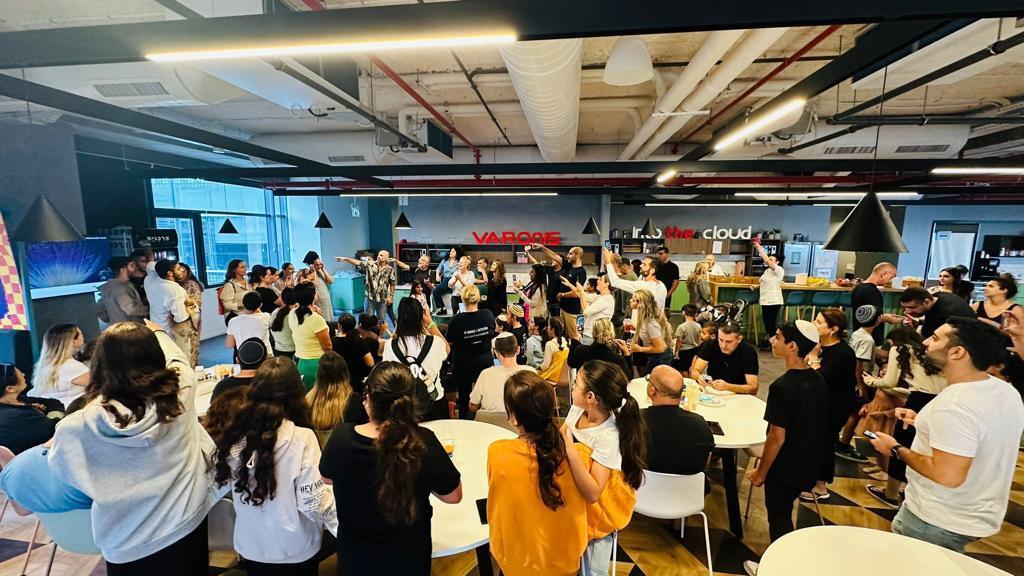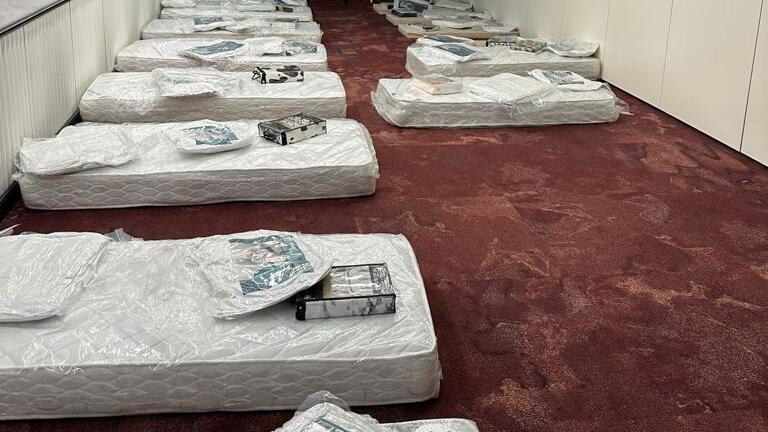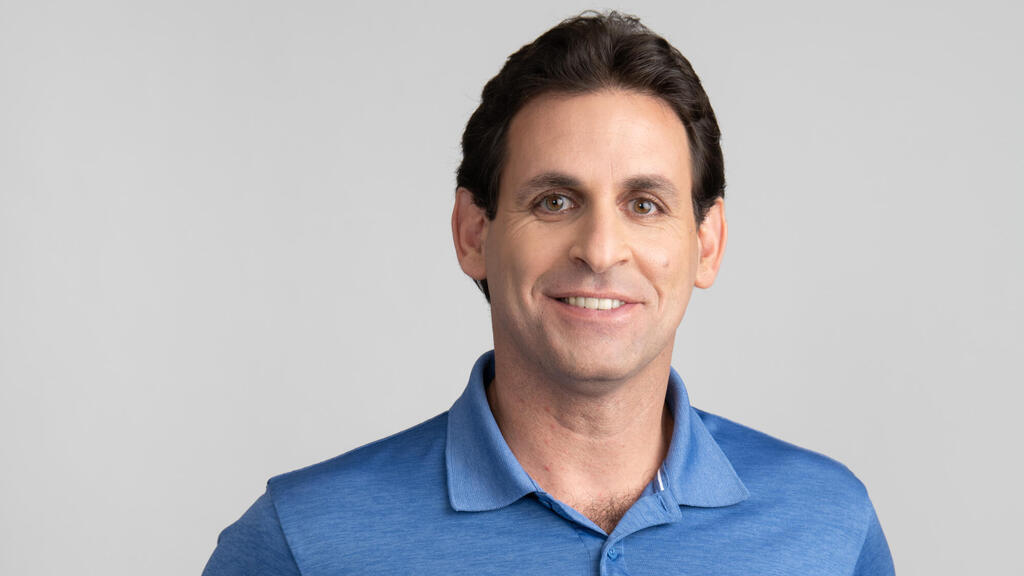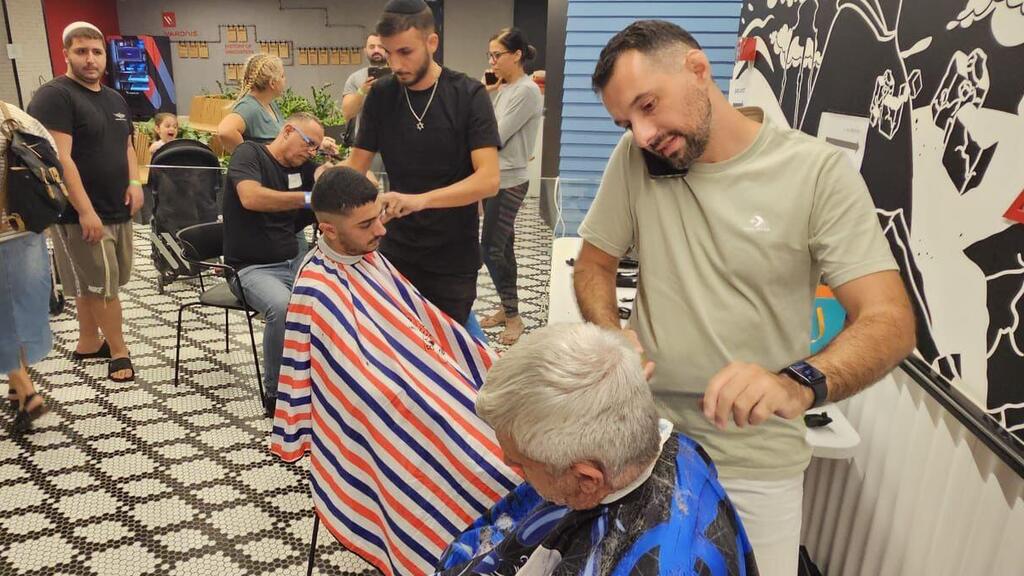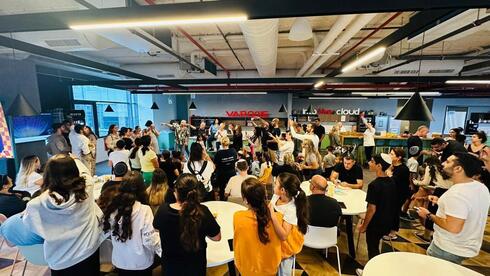
ISRAEL AT WAR
Good offices: Varonis opens doors, hearts to evacuees
With the outbreak of war, Varonis took in 250 evacuees in its offices in Herzliya. "We essentially turned into a hotel," said CFO and COO Guy Melamed. A week later, Varonis moved them to a hotel that it paid for from the workers' days off.
Israeli cyber company Varonis, which sits in the center of the high-tech community in Herzliya, made an unusual move at the outbreak of Israel’s war against Hamas, it converted the office’s open space into a huge camp for 250 evacuees from the southern cities of Netivot, Ofakim, and Ashkelon and the northern city Kiryat Shmona. As the war continued, the company turned to its employees and asked them to redeem payment for their vacation days in order to finance the stay of the evacuees in a hotel in Herzliya.
Guy Melamed, CFO and COO of Varonis, told Calcalist about the unique decision, its quick execution, and the satisfying feeling of not standing by idly.
.How was the idea born?
"On the night of that terrible October 7, we sent an email to the employees asking them to work from home. There was no problem, we were already used to this because of the coronavirus pandemic. We started collecting donations for the reservists, but we felt that it was not enough and that something more significant should be done. We have very large and luxurious offices in Herzliya, so I contacted the Herzliya municipality and asked if there was a need for a free place for civilians, because it was clear that everyone was in full ‘putting-out-fires’ mode. When they said there was a great need, we started running with the mission and getting organized."
How do you do it in real-time? Hoteliers reported crazy wear and tear in hotels with such a quantity and composition of evacuees.
"At 9:30 on the Tuesday of the outbreak of the war, we made a Zoom call to ask ourselves if we had the ability to accommodate evacuees in a special way. It came from the heart. We were not afraid of using our offices. We did not hesitate for a moment. At 10:15, I arrived at the municipality to ask what the need was. By 10:30 I was already in talks with mattress suppliers. We decided to purchase 250 mattresses, the problem was that a mattress had become such a rare commodity because everyone purchased mattresses for soldiers or evacuees. There were hardly any mattresses to be found. We bought everything that any supplier could offer. We also bought blankets, pillowcases, and pillows for 250 people. In the meantime, we removed the office's items from the open space.
"Because most of the evacuees are religious, we had to bring in an elevator technician to set up a Shabbat elevator, because the building is four stories, bring food heating plates for the Shabbat observant, and a Shabbat kettle. We had to disable the light that turns on automatically. You have to take care of the physical things, but the more significant thing is the mental side. People came to us completely torn apart. They came in, shaking.
"We knew that if the children were happy, the parents would be able to sleep for a while. We took care of every detail. We took the children straight to the popsicle fridge so they could smile. We checked them in like in a hotel. Employees took care of hygiene, and the municipality of Herzliya provided psychologists and social workers. We brought in catering for meals. We become a hotel for all intents and purposes.”
What was the condition of the people who came to you?
"People came broken. The lack of security and the loss of trust was something we had to work on extremely carefully. 250 people come to you with terrible fear. We tried to organize security, but the problem is that even armed security in the State of Israel is impossible to obtain these days. I contacted every security company in Israel, including personal contacts - and nothing. There is no armed security guard to be found. At Varonis there is 24/7 security, but not armed."
Melamed says that the distrust of the evacuees was so great that it was also directed towards their hosts. "People thought - why would a company do such a thing for people it doesn't know? They told me: 'You gathered 250 people in one place and now it will be easy to slaughter us all together'. I thought to myself - what goes through these people's minds? It's madness. But a moment later I realized I couldn't judge them. When we brought police officers, instead of relaxing, they became stressed. There were those who thought they were terrorists disguised as police officers. People arrived injured."
You have to create trust in a place where people are suspicious of everything.
"We found out very quickly that it is impossible to generate trust with rational arguments. Let's say a thought like, 'You brought us all together to slaughter us' - when you say, 'We are a public company, traded on the NASDAQ, Israeli founders' - they don't calm down. You understand that this is an emotional story, not a rational one, and if we were in their situation I'm not sure we would feel any different. We handed out bracelets to the volunteers in one color, and to the evacuees in another color, and the color differences in the bracelets also created concerns that it might be meant to differentiate between us if something was done to them. Real conspiracy theories. It's hard to explain, but that's how people who have gone through such a terror event think."
How does all this work operationally?
"On the fourth floor, there was a large dining room where they ate three meals that were provided throughout the day from catering and donations. In the underground parking lot, we opened play areas - basketball, hockey, ping pong. We bought 13 PlayStations. We have five showers at the entrance to the office. We created cleaning shifts, dish removal, etc. It simply became a kibbutz. Volunteers in Herzliya washed their things."
A week later, the company realized that the space was not suitable for hospitality. "In the end, the place is not built for this, even on a sanitary level. More than that, they slept sparingly without privacy. It was a good solution for the first week of the war, before the State decided what to do, when people got into their cars and barely packed a suitcase, and just wanted to escape. We were afraid that if a front opened in the north and they would evacuate all of it - there would be no more hotels available for them."
The company moved the evacuees to the NYX Hotel in Herzliya. "We initially moved them there at our own expense for two weeks. We knew that as a public company. at a certain point we would not be able to finance it anymore. We approached our employees and asked if they would agree to redeem their days off in order to continue financing their stay at the hotel, and within a day and a half we raised NIS 2 million ($500,000) and extended their stay by two weeks. When we told the evacuees, there were some who started crying. We will try to extend their stay here for another week, but they know that the war can last for months and that we will not be able to solve the problem of their stay beyond that."
According to Melamed, a special bond was created between the workers and the evacuees. "We will stay in touch with them, that's for sure. Anyone who wasn't part of it won't understand how much intimacy was created between us in this thing. There was a single mother who called the war room that we set up, but she was so afraid to give her details that she wasn't ready to come to a taxi before she spoke to the taxi driver on the phone and did not give the address of the house to be picked up, only the address of the synagogue next door. She arrived at us at 01:30 in the morning with a dog, a cat, and a 4-month-old baby in the taxi.
"There were people who came with animals. Smaller dogs we left; larger dogs we brought in an animal trainer to try to find a place for them in the kennels, because with all the children walking around we wanted to make sure there were no problems with this."
Are you able to make a comparison with other historical periods in your head?
"The word ‘holocaust’ is a big word, without minimizing what happened on October 7. I think that all of us, as members of the education system in Israel, learned about the pogroms in Kishinev, about Kristallnacht, and we didn't know how it really felt. On October 7, we understood how it felt. Back then, compared to today, there was no one to help those people, and here there was. In the first weeks, for those who had to evacuate, the help came more from citizens than from the state. I have never witnessed a catastrophe of this magnitude, but the mutual responsibility people had for one another here was unbelievable. The number of people who wanted to volunteer was four times greater than what we could accommodate. We had everything from doctors, social workers from Herzliya and the surrounding area, veterinarians, our employees, to people who contributed money or time. This is something to be proud of. This is the difference between then and now."









